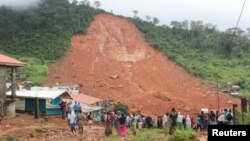Thousands of people in Sierra Leone left homeless by a mudslide which killed at least 270 people urgently need food, shelter and healthcare, aid agencies said on Tuesday, as they raced to prevent outbreaks of fatal diseases such as cholera and typhoid.
A mountainside collapsed on the outskirts of the capital Freetown on Monday morning, burying dozens of homes as people slept in one of Africa's deadliest mudslides in decades.
Rescue workers have recovered 270 bodies so far in the mountain town of Regent and the search continues for more, Freetown mayor Sam Gibson said on Tuesday.
"We estimate that at least 3,000 people are homeless ... they need shelter, medical assistance and food," Sierra Red Cross Society spokesman Abu Bakarr Tarawallie said by phone.
"We are also fearful of outbreaks of diseases such as cholera and typhoid," he told the Thomson Reuters Foundation from Freetown. "We can only hope that this does not happen."
Contaminated water and water-logging often unleash potentially deadly diseases like cholera and diarrhea after floods and mudslides.
Torrential flooding has also destroyed buildings and covered homes in low-lying areas of Freetown, agencies said.
"Houses have been totally submerged and washed away," said Ramatu Jalloh, advocacy director at Save the Children. "Families are trying to gather their lives together but they have lost their homes, all of their possessions, their whole livelihoods."
President Ernest Bai Koroma on Monday evening told residents of Regent and other flooded areas to evacuate immediately so that military personnel and rescue workers could continue to search for survivors that might be buried underneath debris.
The United Nations children's agency (UNICEF) is providing trauma counseling and therapy to families and children in the dozen-odd communities struck by the mudslide.
"You can see people openly grieving ... there is a lot of hurt to address," said UNICEF spokesman John James.
Britain's aid department said it is sending assistance, having invested in disaster preparedness and emergency response since the Ebola outbreak which ravaged the former British colony from 2014 to 2016, infecting 14,000 people and killing 4,000.
"From stopping the Ebola outbreak in its tracks to helping the country rebuild after this deadly event - the UK continues to stand by the people of Sierra Leone," said Priti Patel, the minister of the Department for International Development.
Several aid agencies told the Thomson Reuters Foundation they were bracing for more heavy rainfall in the coming days.





